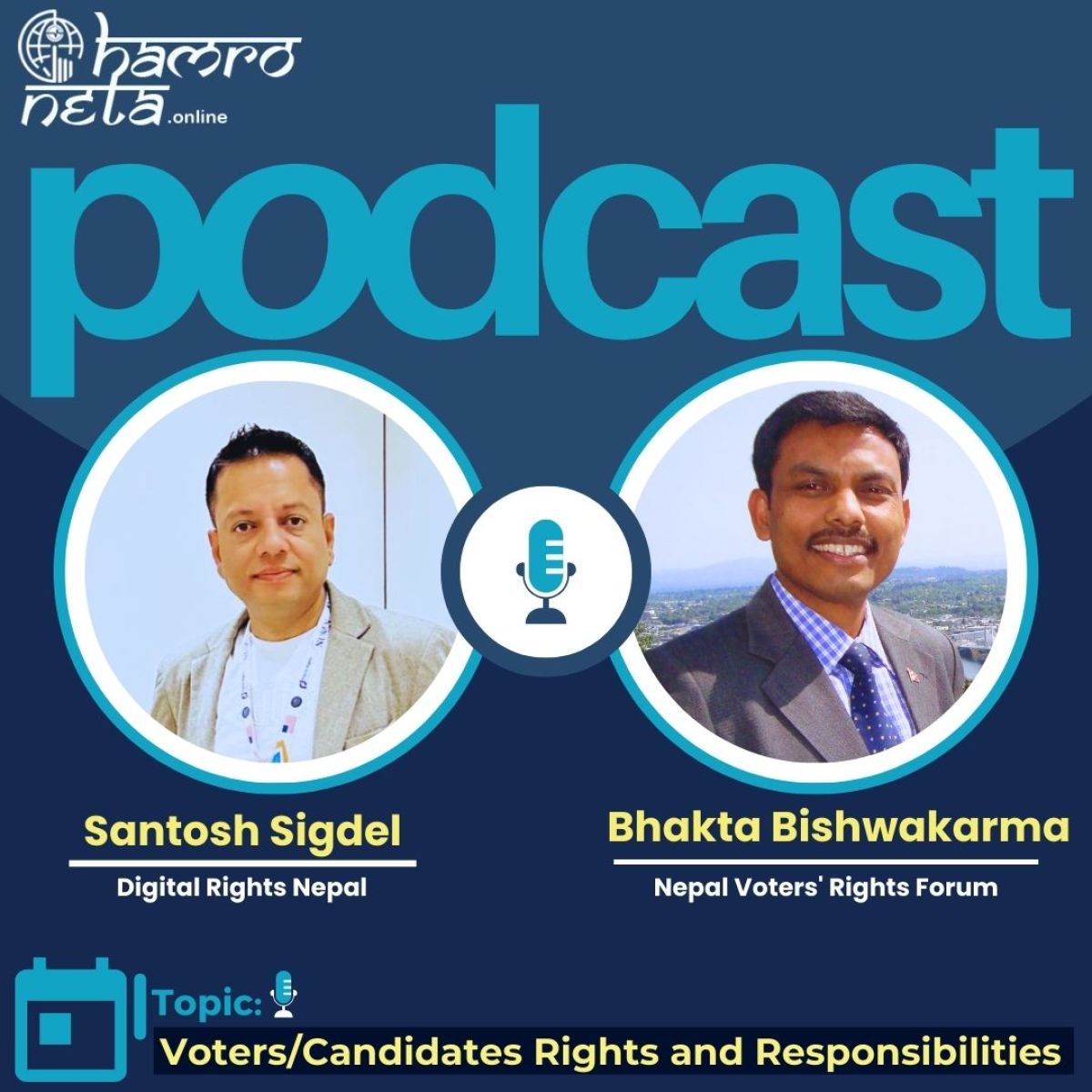
Understanding Voters’ Rights in Nepal
Understanding Voters Rights in Nepal
Voting is both a privilege and a duty, shaping the future of our communities and nation. But do we really understand our rights and responsibilities as voters? In our recent podcast, we explored this topic with Bhakta Bishwokarma, Chairman of the Nepal Voters Rights Forum, hosted by Santosh Sigdel, Executive Director of Digital Rights Nepal. The episode discussed the fundamental rights of voters and the responsibilities necessary to maintain a fair, transparent democracy.
In this blog, we will recap key points from the episode, focusing on the rights guaranteed to every voter and the responsibilities that keep elections inclusive and accountable.
Summary
The discussion centered on the Integrated Election Bill, which aims to reform Nepal’s electoral process. The key stakeholders, including government representatives, political parties, election observation committee, its potential impact, and the need for consensus to ensure smooth elections. The episode highlighted ongoing reforms and evolving approaches to election management in Nepal.
The host remarked that elections in Nepal have traditionally been seen as a five-year “festival,” with little post-election engagement. However, this mindset is shifting, as election work continues year round, with a focus on improvement.
Voter Rights in Nepal
Bhakta Bishwokarma described voter rights as the foundation of democracy, asserting that each eligible citizen should be able to vote freely. Voter rights encompass several elements: education, registration, accessibility, and a conducive voting environment. For example, the eligibility age is eighteen, and registration is the first step, allowing citizens to exercise their right to vote. Bishwokarma emphasized that proper education on the electoral process and candidates is critical for an informed vote.
Challenges in Nepal's Electoral System
Nepal’s citizenship issues have also affected voter eligibility. Citizenship is essential not only for voting but for social, economic, and political participation. Bishwokarma stressed that without citizenship, individuals cannot register to vote, limiting their rights in a fundamental way. The impact of this challenge reverberates throughout the democratic process, potentially excluding valuable voices from the electoral system.
Inclusive Elections
When addressing inclusivity, Bishwokarma highlighted challenges related to eligible voters living abroad or in prison. Although the Supreme Court has introduced regulations to enable voting for Nepalese outside the country, these provisions have yet to be implemented, leaving certain groups without access to the ballot. He noted that implementing pre-voting processes could help ensure inclusivity, enabling security personnel and other election volunteers with time constraints to cast their votes as well.
Technology and Access to Information
There was discussion on whether Nepal elections should still follow the traditional nine to five schedule due to security concerns. While the role of technology has become increasingly significant, though it presents both opportunities and challenges. While digital advancement has dramatically improved access to information, ensuring the accuracy and reliability of this information remains a critical challenge. The discussion emphasized the importance of maintaining a balance between digital and traditional offline promotion methods, recognizing that not all voters have equal access to or comfort with digital technologies.
Language barriers in voting materials present another significant challenge, particularly in Nepal's multilingual society. The need for comprehensive digital literacy programs was highlighted as crucial for combating misinformation and ensuring voters can make informed decisions.
Accessibility Challenges
Election accessibility is a priority, with polling places in schools, open grounds, and temples, though these locations may pose challenges for individuals with disabilities or women avoiding temple-based polling stations during menstruation due cultural barriers. Bishwokarma mentioned there need to be collaboration between political parties and the Election Commission to ensure polling stations are accessible to all.
Security and Transportation
Nepal’s practice of halting public transport on election day aims to enhance security. Yet, access to transportation remains crucial for voter turnout. The Election Commission is encouraged to consider transportation needs while balancing security.
Importance of Voter Education
Voter, civic, and election education are essential, ensuring voters understand the process and their ballots are not wasted. An election calendar should be established to allow ample time for voter education, which ultimately strengthens nation-building.
Protecting Voter Rights and Stakeholder Responsibility
Bishwokarma emphasized that protecting voter rights requires active involvement and effort from multiple stakeholders. The Election Commission bears primary responsibility for managing the electoral process, but political parties, local bodies, and law enforcement agencies all play crucial roles. Political parties, in particular, must mature beyond traditional approaches and embrace more inclusive, progressive practices that encourage participation from all segments of society.
Misinformation and Disinformation during Election
Digital literacy is increasingly critical to counter misinformation, which can manipulate or mislead voters. Political parties and the government must strengthen systems to reduce the impact of misinformation, especially during elections.
The podcast concluded with a reminder to strike a balance between regulation and freedom, ensuring a system that serves democracy and protects voter rights.
By recognizing our rights and responsibilities as voters, we contribute to a democratic Nepal where each vote builds a more inclusive, representative society.
This blog post is based on a podcast episode featuring discussions between Bhakta Bishwokarma and Santosh Sigdel on Voter Rights in Nepal. To watch the full episode, follow the link:
https://www.youtube.com/watch?v=vGADWVIX31Y&ab_channel=BhugolPark
Comments